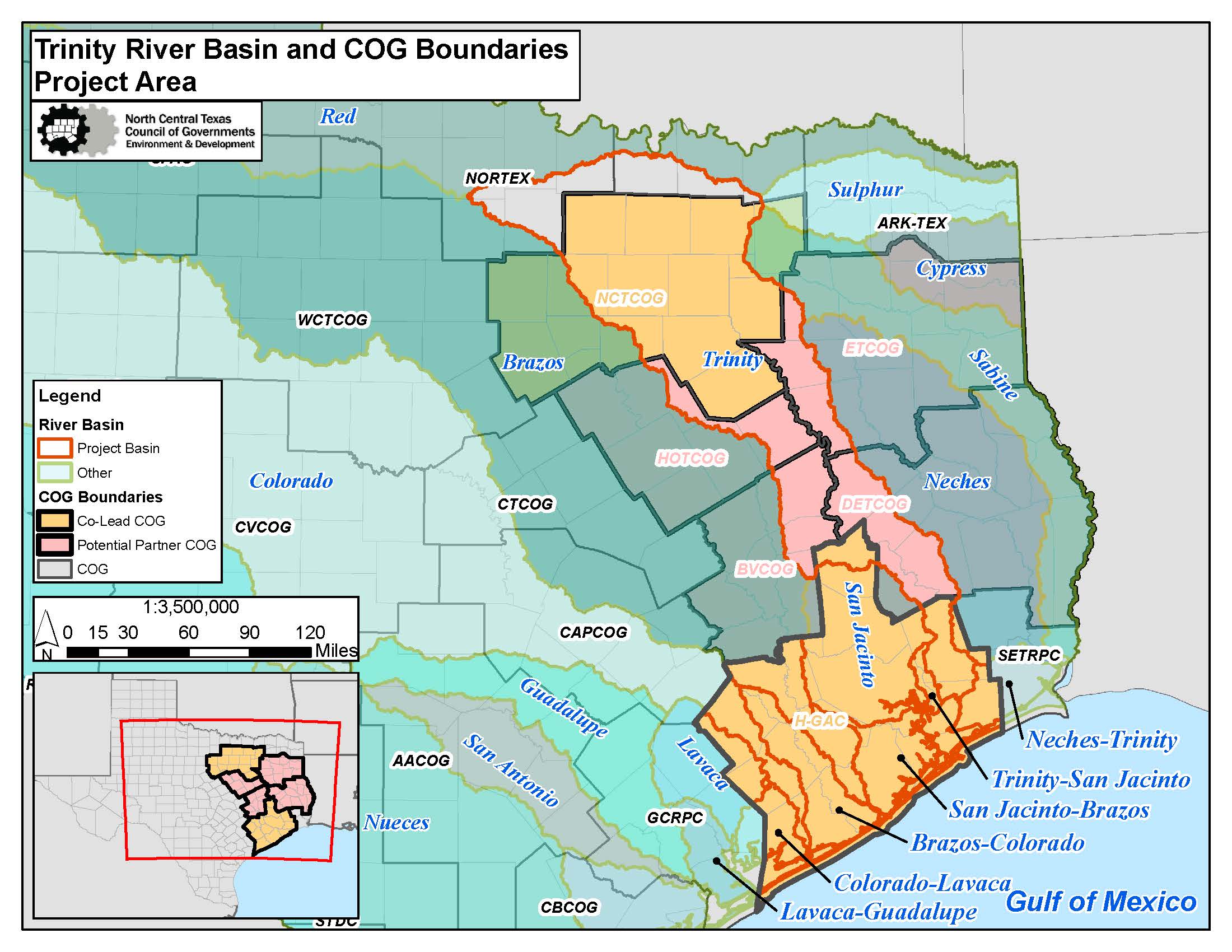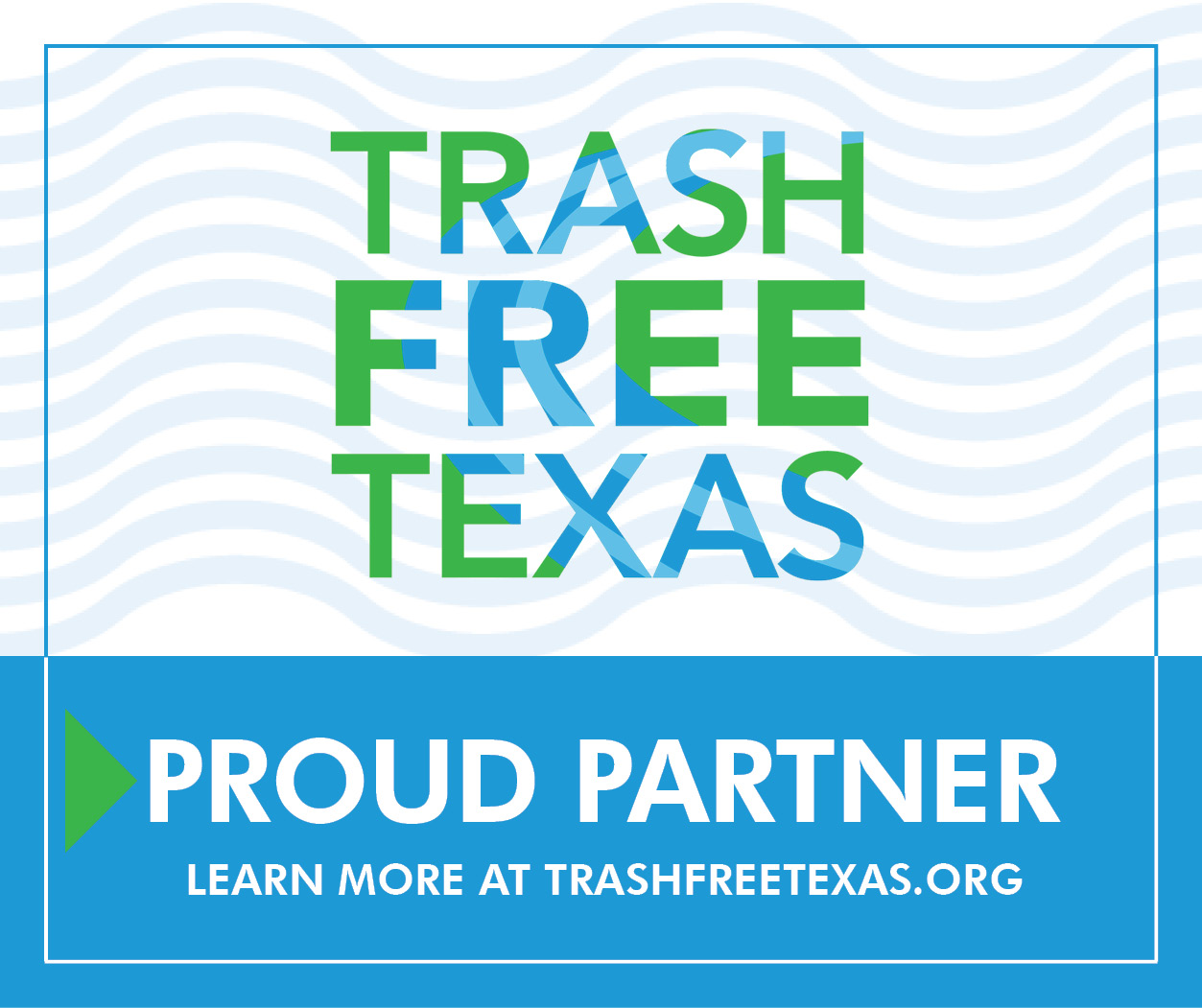Trash Free Waters Project
NCTCOG partnered with the Houston-Galveston Area Council and The Meadows Center for Water and the Environment from September 2020 through August 2023 to establish a unified, coordinated approach to litter abatement and community engagement in the six river basins in the Dallas-Fort Worth and Houston-Galveston regions.

The Dallas-Fort Worth and Houston areas represent over 50% of the state’s total population and are connected through these basins, and ultimately impact Galveston Bay and adjacent areas in the Gulf of Mexico. Trash removal from these watersheds requires an ongoing, significant effort that comes with great expense to local governments and many non-profit partners. Texas cities spend millions of dollars each year to remove litter, and 80% of escaped trash ends up in our waterways. This trash debris can affect aesthetics, tourism, business, and wildlife.
Project Goals
Through this 3-year project, the project team sought to:
- Increase Adopt-A-Spot locations through Trash Free Texas and support a common, publicly available Trash Collection Database for the state of Texas.
- Provide outreach and engagement support for regional clean-up events through partnerships with local governments, recreational clubs (such as paddling groups and running clubs), and Keep Texas Beautiful affiliates.
- Work with Texas-based restaurants to reduce the usage of single-use plastic.
- Share project successes with other councils of government and replicate this work across the state.
Resources
Users Guide – Explains process for adding your entity's sites to the Trash Free Texas Adopt-A-Spot map
Houston-Galveston Area Council's Trash Free Waters Project
Trash Free Texas Restaurant Program and Recreational Litter Cleanup Program Toolkit Piloting
The project team completed a pilot of the resources and strategies in the Trash Free Texas Restaurant Program draft toolkits, which can be found below. Ten entities participated in the pilot and were invited to share their feedback at the end of the project.
- Toolkit for Restaurants
- Toolkit for Communities
- Trash Free Texas Restaurant Program Flyer
- Recreational Litter Cleanup Toolkit
Texas Litter Database
Tracking litter data is an important component of understanding, managing, and preventing litter in Texas and its waterways. This was the purpose behind the development of the Texas Litter Database, which was created by Keep Texas Beautiful, the Houston Advanced Research Center, and Black Cat GIS, and funded by the Garver Black Hilyard Family Foundation. Launched in July 2021, the Texas Litter Database organizes and stores the trash and marine debris data collected in Texas in a central location and can be accessed through any smart device or computer at texaslitter.org. Most importantly, the database can be used by everyone: litter cleanup volunteers, cleanup site coordinators, researchers, or any other user, to input, view or download trash collection data.
All litter cleanup volunteers and cleanup event organizers are encouraged to enter their data in the database. A link is included on the bottom right-hand corner of the Trash Free Texas Adopt-A-Spot map so that volunteers who have adopted sites from the Trash Free Texas website can easily access the database to enter their litter data.
Events
Trash Free Texas, funded by an Environmental Protection Agency contract, ended on September 30, 2023. Despite this, we're dedicated to finding new funding to sustain our mission. While Adopt-A-Spot updates and partner form processing pause temporarily, the Trash Free Texas website and map will stay active, offering valuable resources. Stay tuned for updates as we transition and thank you for supporting our Texas waterways' cleanliness.
The Trash Free Waters: North Central Texas Newsletter was launched by NCTCOG in March 2021 and published quarterly through September 2023. It highlighted NCTCOG and its partners' efforts on the Trash Free Waters project as well as other projects, events, and partnerships that focus on reducing trash in North Central Texas waterways.
Who is funding this project?
This project was funded by the United States Environmental Protection Agency’s Gulf of Mexico’s Trash Free Waters program. This program encouraged collaborative solutions to reducing trash in our waterways, most of which originates on land.
How long will the project last?
NCTCOG’s project began in late 2020 and lasted approximately three years.
What is Trash Free Texas?
The Trash Free Texas website and its online mapping tool facilitate litter cleanup activities throughout Texas by connecting volunteers with litter cleanup locations.
What information is needed to add adoptable litter cleanup locations to the Trash Free Texas?
To add your adoptable cleanup locations, you will need the following:
- Location name,
- Latitude and Longitude coordinates for each of your adopt-a-spot sites,
- Adoption status of each location, such as available or adopted, and
- Contact information for your cleanup locations.
How can I get involved?
You can get involved in three ways:
- Sign-up to receive our emails about upcoming events, such as webinars/workshops, or cleanup events.
- Attend or promote the Trash Free Water’s project activities on social media or through word of mouth.
- Add your entity’s cleanup locations to the Trash Free Texas website so that volunteers can find locations in your area to clean up litter.
Where can I find shareable information on the Trash Free Waters Program?
You can find further information to share by downloading the Trifold Brochure or the Trash Free Waters Fact Sheet, both courtesy of the EPA.

